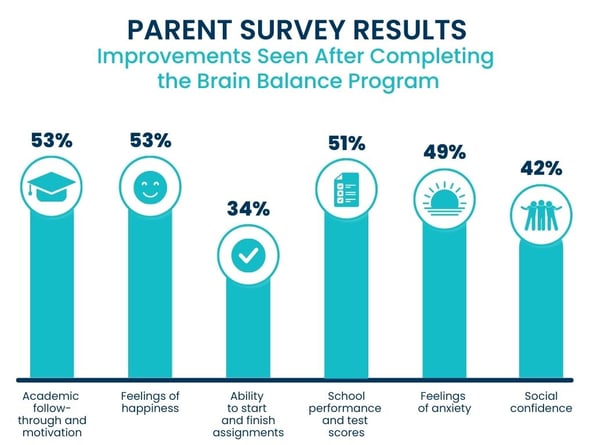The following is an overview of data from four years of archived survey responses from parents of students, aged 4 to 17 years old, who enrolled in the Brain Balance Program.
Parents were asked questions at the beginning and end of the program about anxiety, worrying, depression-like symptoms, mood, obsessive thoughts or behaviors, social withdrawal, pessimism, emotional regulation, emotional self-awareness, and emotional expressiveness.
Before program participation, all students tested below age-appropriate developmental levels. The Brain Balance Program consisted of three 1-hour in-center sessions per week, along with other multimodal activities targeting proprioception and balance, vestibular functioning, fine motor skills, rhythm and timing, auditory and visual processing, and retained primitive reflexes.
The study data revealed that nearly all the children and adolescents who participated in the Brain Balance Program showed improvements in well-being, with many categories reaching an average of 40-50% improvement. Below are highlights of these important improvements.

The data reflect the average percentage improvement in parental responses to survey questions from initial program enrollment to program completion at 5-6 months. The survey included data from children (aged 4-17 years) who participated in the Brain Balance Program for a duration of 5-6 months (1 hour/day, 3 days/week). This time frame is the most common program length with the most data points.
- Child's academic follow-through and motivation.
"Teacher has commented, “If he only would try harder” or “He’s lazy”.": 559 responses
- Feelings of happiness.
“Child seems depressed.”: 428 responses
- Child's ability to start and finish assignments.
"Child is slow to begin/finish assignments.": 1347 responses
- School performance and test scores.
"Child has shown a downward trend in test scores or school performance.": 849 responses
- Feelings of anxiety.
"Child may experience panic/anxiety attacks.": 476 responses
- Social confidence.
“Child withdraws socially.”: 689 responses
Additionally, parental responses showed that, after 5-6 months of program participation, 75% of children showed up to 25% improvement, and 25% of children demonstrated 60-85.7% improvement, in the following areas: panic/anxiety attacks, worrying, depression-like symptoms, mood, obsessive thoughts or behaviors, social withdrawal, pessimism, emotional regulation, emotional self-awareness, and emotional expressiveness.
These findings suggest the potential value of nonpharmacologic training programs in improving mental well-being in children and adolescents with developmental or learning challenges, especially programs that are comprehensive and multimodal.
How Brain Balance Can Help
Brain Balance offers a personalized, drug-free program helping individuals improve focus, behavior, social skills, anxiety, and academic performance. The program takes an integrative approach to strengthening brain connectivity through sensory engagement, physical development, academics, and nutrition.
The non-drug nature of the Brain Balance program may make it a more appealing option than the use of medication, which at optimum dosing has been shown to have a clinician-rated reduction of 30% in ADHD symptoms.1
"It is exciting to see parents document symptomatic change in many areas,” said Rebecca Jackson, Vice President of Programs & Outcomes at Brain Balance and co-author of the study. “Many families are looking for non-drug options for their children. Programs like this, which are comprehensive in nature, can be a great alternative or supplement for them to consider.”
Additional Research Supports Findings
Brain Balance has completed research studies with Cambridge Brain Sciences and Harvard University’s McLean Hospital to evaluate the impact of integrative training programs on brain activity and connectivity. This research is leading to better and brighter futures for children and teens with emotional, learning, and developmental challenges.
If you believe your child could benefit from Brain Balance, an assessment could help show if there are areas for improvement. To book an assessment, find your local center here.
1 Strawn, J., Mills, J., Sauley, B., Welge, J. (2018). The impact of antidepressant dose and class on treatment response in pediatric anxiety disorders: A meta-analysis. J. Am Acad Child Adolesc Psychiatry. Apr; 57(4): 235–244.e2. doi: 10.1016/j.jaac.2018.01.015.
Jackson R, Robertson JM. A Retrospective Review of Parent-Reported Anxiety and Emotional Functioning in Children with Developmental Challenges After Participation in the Brain Balance® Program. J Ment Health Clin Psychol. 2020;4(1): 10-20